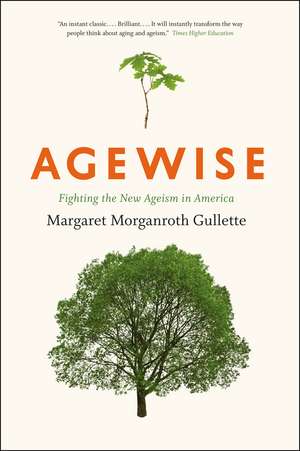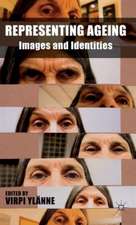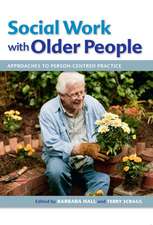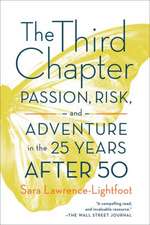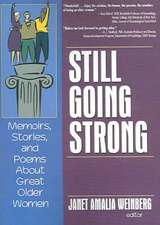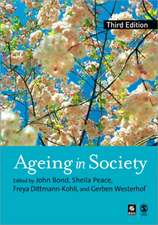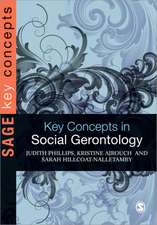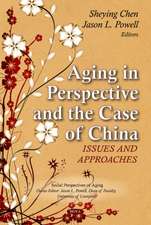Agewise: Fighting the New Ageism in America
Autor Margaret Morganroth Gulletteen Limba Engleză Paperback – 21 oct 2013
In Agewise, renowned cultural critic Margaret Morganroth Gullette reveals that much of what we dread about aging is actually the result of ageism—which we can, and should, battle as strongly as we do racism, sexism, and other forms of bigotry. Drawing on provocative and under-reported evidence from biomedicine, literature, economics, and personal stories, Gullette probes the ageism thatdrives discontent with our bodies, our selves, and our accomplishments—and makes us easy prey for marketers who want to sell us an illusory vision of youthful perfection. Even worse, rampant ageism causes society to discount, and at times completely discard, the wisdom and experience acquired by people over the course of adulthood. The costs—both collective and personal—of this culture of decline are almost incalculable, diminishing our workforce, robbing younger people of hope for a decent later life, and eroding the satisfactions and sense of productivity that should animate our later years.
Once we open our eyes to the pervasiveness of ageism, however, we can begin to fight it—and Gullette lays out ambitious plans for the whole life course, from teaching children anti-ageism to fortifying the social safety nets, and thus finally making possible the real pleasures and opportunities promised by the new longevity. A bracing, controversial call to arms, Agewise will surprise, enlighten, and, perhaps most important, bring hope to readers of all ages.
Preț: 213.21 lei
Nou
Puncte Express: 320
Preț estimativ în valută:
40.80€ • 42.15$ • 33.94£
40.80€ • 42.15$ • 33.94£
Carte tipărită la comandă
Livrare economică 20 martie-03 aprilie
Preluare comenzi: 021 569.72.76
Specificații
ISBN-13: 9780226101866
ISBN-10: 022610186X
Pagini: 304
Ilustrații: 2 halftones
Dimensiuni: 152 x 229 x 23 mm
Greutate: 0.4 kg
Editura: University of Chicago Press
Colecția University of Chicago Press
ISBN-10: 022610186X
Pagini: 304
Ilustrații: 2 halftones
Dimensiuni: 152 x 229 x 23 mm
Greutate: 0.4 kg
Editura: University of Chicago Press
Colecția University of Chicago Press
Notă biografică
Margaret Morganroth Gullette is the author of three previous books, including Aged by Culture, which was chosen a Notable Book of the year by the Christian Science Monitor, and Declining to Decline.
Cuprins
Introduction: The New Regimes of Decline
A Historical Tsunami
part one: the hidden coercions of ageism
1 The Eskimo on the Ice Floe
Is It Aging or Ageism That Causes the Pain?
2 The Mystery of Carolyn Heilbrun’s Suicide
Fear of Aging, Ageism, and the “Duty to Die”
3 The Oldest Have Borne Most
Katrina and the Politics of Later Life
part two: in the feminist country of later life
4 Hormone Nostalgia
Estrogen, Not Menopause, Is the Public Health Menace
5 Plastic Wrap
Turning against Cosmetic Surgery
6 Improving Sexuality across the Life Course
Why Sex for Women Is Likely to Get Better with Age
part three: our best and longest-running story
7 Our Best and Longest-Running Story
Why Is Telling Progress Narrative So Necessary, and So Difficult?
8 The Daughters’ Club
Does Emma Woodhouse’s Father Suffer from “Dementia”?
9 Overcoming the Terror of Forgetfulness
Why America’s Escalating Dread of Memory Loss Is Dangerous to
Our Human Relations, Our Mental Health, and Public Policy
10 Elegies and Romances of Later Life
Are There Better Ways to Tell Our Saddest Later-Life Stories?
Afterword: The Next Angels in America
Acknowledgments
Notes
Bibliography
Index
A Historical Tsunami
part one: the hidden coercions of ageism
1 The Eskimo on the Ice Floe
Is It Aging or Ageism That Causes the Pain?
2 The Mystery of Carolyn Heilbrun’s Suicide
Fear of Aging, Ageism, and the “Duty to Die”
3 The Oldest Have Borne Most
Katrina and the Politics of Later Life
part two: in the feminist country of later life
4 Hormone Nostalgia
Estrogen, Not Menopause, Is the Public Health Menace
5 Plastic Wrap
Turning against Cosmetic Surgery
6 Improving Sexuality across the Life Course
Why Sex for Women Is Likely to Get Better with Age
part three: our best and longest-running story
7 Our Best and Longest-Running Story
Why Is Telling Progress Narrative So Necessary, and So Difficult?
8 The Daughters’ Club
Does Emma Woodhouse’s Father Suffer from “Dementia”?
9 Overcoming the Terror of Forgetfulness
Why America’s Escalating Dread of Memory Loss Is Dangerous to
Our Human Relations, Our Mental Health, and Public Policy
10 Elegies and Romances of Later Life
Are There Better Ways to Tell Our Saddest Later-Life Stories?
Afterword: The Next Angels in America
Acknowledgments
Notes
Bibliography
Index
Recenzii
"We haven't done justice to age in the popular press. Margaret Gullette may change that. It will be a more mature country that takes note of so important a voice, giving hope that our culture may yet value wrinkles—the face's road map of experience—accumulated from smiles, tears, and the hard-won wisdom of the body."
"Margaret Morganroth Gullette is one of the shining lights of age studies. For two decades she has been sweeping her bright searchlight across the landscape of American social, political and popular culture to identify and analyze ageism wherever it lurks. In provocative chapters laced with insight and originality, Gullette examines a broad range of subjects from later-life sexuality to dependency, from midlife layoffs to suicide."
"Eloquent and infuriating, packed with facts and bristling with ideas, Agewise is essential reading for anyone who is 'aging'--which is to say, everyone."
“Margaret Morganroth Gullette is a brilliant analyst and she makes strong and convincing arguments that ageism is far from dead. Agewise also makes an extremely powerful case on behalf of ‘progress,’ or what I call ‘positive aging.’ Her book is a call to arms for us to wake up to a prejudice that afflicts us all. A must read.”
"An instant classic. . . . Gullette's scholarship is sound and wide-ranging. She has a great command of the literature from history, social sciences research, political theory, economics, morality, religion, women's studies, gerontology, psychology and psychiatry, cultural studies, American civilization, and literary works. This is a brilliant and important book and is filled with terrific analyses and with powerful suggestions about the need for sweeping social change to eliminate the lethality of ageism. It will utterly transform the way people think about aging and ageism."
"'Good stuff happens not because we are still young, but because we are not.' Anyone familiar with the rallying calls of Margaret Morganroth Gullette, one of the leading forces behind the development of 'ageing studies' in the US, will not be surprised to find this cheering thought in her latest book, Agewise. . . . Gullette insists that she is not merely trying to replace the cultural decline narrative with a progress narrative, or disowning our fears or the needs and pains of ageing bodies. Of course, over a long life we will face tragedies and losses, over and over again. However, she listens out for alternative elegies of later life, trawling the resources of literature, memoir, her own life and those of others to suggest ways in which we can face this together. . . Refreshingly, Gullette, in her sixties, is capable of greater self-acceptance of her ageing body and appearance than de Beauvoir could ever manage. . . . In ageing, we may find strength simply in sharing our black humour, defiance and rage, while fighting as imaginatively as we can against the bitterness, perplexity and humiliation that accompany not only our experiences of old age but, increasingly, those of mid-life also."
"A full-throated analysis of and attack on a pernicious new 'ism.' Sample chapter title: 'Hormone Nostalgia.'"
"Gullette is the Amazing Randi of ageist stereotypes. She is forever unmasking intellectual quackery and sociopolitical deceptions intended to sell people in midlife and older years on fears about their shortcomings--fears one might allay with Oil of Olay and other products concocted by the Age-defying Industrial Complex. Gullette deconstructs much of what Americans dread about aging and reveals that it actually results from ageism. The book includes personal stories, little-reported findings from biomedical research, accounts of age-biased coverage of Hurricane Katrina (in which three-quarters of those who died were 60 or older), the impact of the economic meltdown, and social attitudes reflected by major fiction authors. The book is something of a manifesto, elaborating an anti-ageism plan that begins with teaching children that living a long life isn't such a bad thing. Gullette goes on to advocate for stronger social insurance protections that would ensure the benefits of the longevity revolution, both for individuals and society."
"A must-read for anyone expecting to grow old in this culture--most of us, one hopes. Of particular interest are Gullette's [chapters] on cosmetic surgery, late-life sexuality, memory loss, and the suicide of the feminist scholar Carolyn Heilbrun. . . . Gullette's chapter 'Overcoming the Terror of Forgetfulness' is the best essay on memory loss that I have read. Based partly on the author's experiences with her mother, it reveals her deep compassion and insight. . . . Gullette coined the term 'age studies,' that is, a critical perspective on the entire life-course, and Agewise demonstrates that she is a master practitioner of the discipline. She labels ignorance of old age 'a social epidemic.' This bias, she says, can be remedies 'not just by living, which is slow and uncertain, but by raising one's consciousness."
"Award-winning feminist author Gullette takes a hard look at the connection between exaggerated fears about the burden of caring for the elderly and a struggling economy in which older workers have a hard time finding employment. 'Being "too old" is too large a part of the ongoing economic meltdown to ignore.' Describing prejudice against older Americans as bigotry, Gullette refers to negative stereotypes, such as the term "greedy geezers" and the mythical Eskimo practice of putting the elderly on ice-floes, as "hate speech" that makes acceptable the notion that the old have a duty to die. . . . While admitting to the reality of the "bitterness and perplexity and humiliations" of decline, Gullette writes poetically and persuasively in general, and tenderly about her 96 year-old mother, who has suffered considerable memory loss, increasing blindness, and physical frailty but retains her cognitive faculties and joy for life. Important social criticism from a prominent scholar."
"Gullette proposes fresh ways of thinking and intervening to alleviate and, ideally, eradicate ageism pervasive over the life course. . . . Gullette's gift for storytelling enthralls readers."
"This is a very important book. It touches raw nerves. It reaches deep into the culture; it explores a difficult and dangerous terrain. It stirs up emotion. Margaret Morganroth Gullette has thrown herself headlong into the subject. A formidable achievement. A combination of sharp analysis, the marshaling of significant information, and social outrage. Written with literary flair and eloquence."
"Margaret Morganroth Gullette is the person to convince you that this 'decline narrative' is a problem, and that you play a role in changing it. . . . Gullette builds upon her anti-ageist convictions throughout each chapter, and the breadth of topics leaves readers with an understanding of just how ubiquitous ageism is in our culture."
"Her ability to weave together a work that ranges from literary analysis to studies on cosmetic surgery resisters, is seamless and in-depth. . . . Composed in three parts, each section builds on the next with a strong theme of respect for the whole of the human life course. . . . She compares the ‘burgeoning army of the old’ rhetoric to the moral panic surrounding HIV and AIDS in the 1980s, an apt analogy. . . . Bio-medicalization, sexuality and caregiving receive surprisingly fresh analyses. . . . Her turn from mind, as the producer of memory, to the holder of a myriad range of qualities from ethical reasoning and emotional intelligence to judgment and intuition, reminds us that we are whole people rather than a symptom cluster waiting to pounce as we age. . . . At the same time as Gullette describes 'othe'’, she has the uncanny ability to invite the reader to step close to ageing bodies and souls and, then, reminds us that we cannot slide into another’s life course; can never wrap ourselves in their experience of ageing. It is this insight and her keen ability to turn a phrase that makes Agewise both excellent scholarship and a deeply readable and provoking book."
“Gullette ties all these strands together with concepts of a ‘culture of decline’ and the institutionalized ‘systems of decline’ that profoundly and negatively affect the way we see our passage through the life course. . . . Gullette uses provocative and sociologically unconventional types of evidence in the largest part of the book. . . . This makes her work accessible to a wider audience than academics, which is clearly her intent. Hers is a consciousness-raising mission, to take ageism as seriously as racism and sexism. It is a major social issue which impacts all of us into the future. . . . Gullette has provided a devastating cultural critique. . . . This book is a wake-up call for all of us.”
"Agewise stands as a thoroughly comprehensive study, one which meets all of its claims and does so tenaciously and with a rigour that reflects the depth of both. . . . The dual figurations of feminist thought and narratological analysis respectively inform and shape the course of the book. As the author notes, this is at least in part because 'aging is a narrative.' Thus, the study is shaped first and foremost by its attention to narrative, its study of one narrative [decline, in the United States] and its shape as a narrative. . . . Its beginning is its end and the progression is wonderfully symmetrical, uniform and measured. No detail remains without return or recapitulation, including the reference to Conan O’Brien's joke about the AARP installment of the 2008 U.S. presidential debates. . . . Make no mistake, as much as the deeply detailed research is there, this a carefully crafted narrative, one which follows the archetypal construction of such, whether one is a student of Frye or Bakhtin, Propp or Campbell. There is a descent and an ascent; the beginning is the daemonic parody of the end."
"As an independent scholar, Gullette has established a distinguished career in “age studies,” a term she coined in 1993 to describe the arm of cultural studies that shines a laser on aging, age inequality, and ageism. She has introduced several other new terms into the lexicon of age scholars: the age gaze, ageist ableism, decline ideology, middle-ageism. By giving names to age-related offenses, she hopes to raise public awareness and ignite the fires that fan social change."
"Gullette argues that ageism stems from the perception that old people are irrelevant...—the trope that the elderly are locusts who swarm the earth consuming all our resources... that pharma and cosmetic companies aren’t catering to the old so much as catering to the ageist idea that getting old is unbearable...Gullette warns against not only stereotypes of decline but also 'the opposite homogenization: positive aging.'"
"Through the lens of cultural criticism, and in the field of age studies of which she’s a pioneer, Gullette has been tracking examples of "decline narratives" related to aging, in favor of "progress narratives," for more than four decades...Through her decades of criticism, Gullette often compares ageism to the other isms that have more entrenched, and integrated social movements such as racism, sexism and ableism. Of these, she maintains, “ageism is the least censured, the most acceptable and unnoticed of the cruel prejudices.” If that’s so, the movement has at least one champion with Gullette. "
"But Margaret Gullette gives us more than a jeremiad. Hers is a positive vision, offering many specific proposals for a movement of resistance that could encourage an epistemic shift—a new conception of life’s course, a fresh understanding of words like ‘age,’ ‘youth,’ ‘decline,’ and of much more. A profoundly engaged, urgent work of the humanist imagination.”
